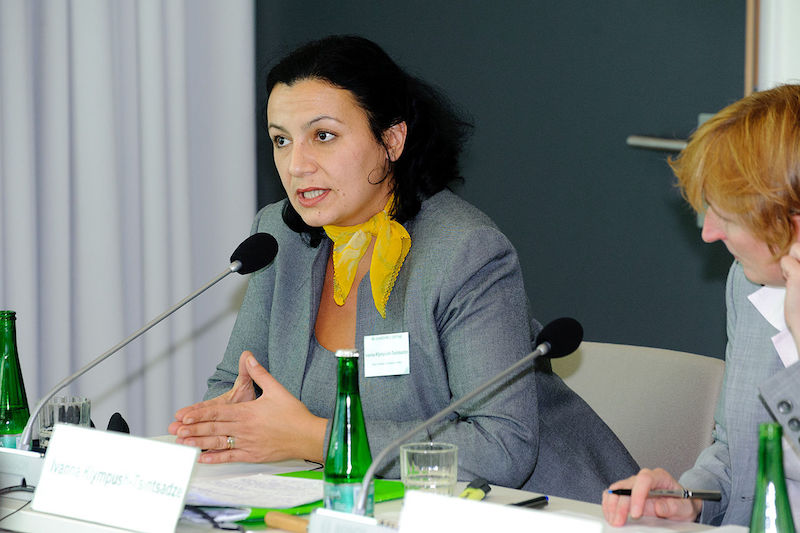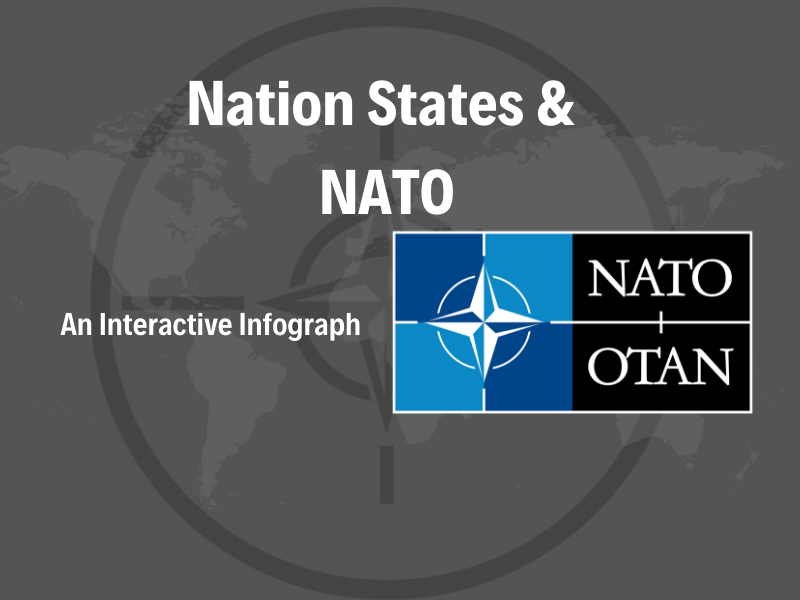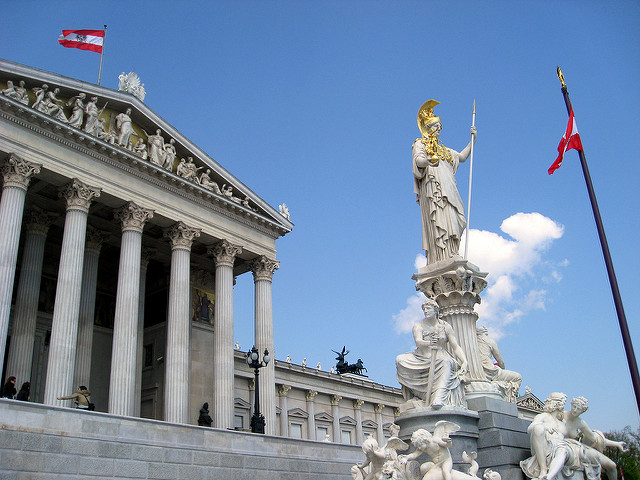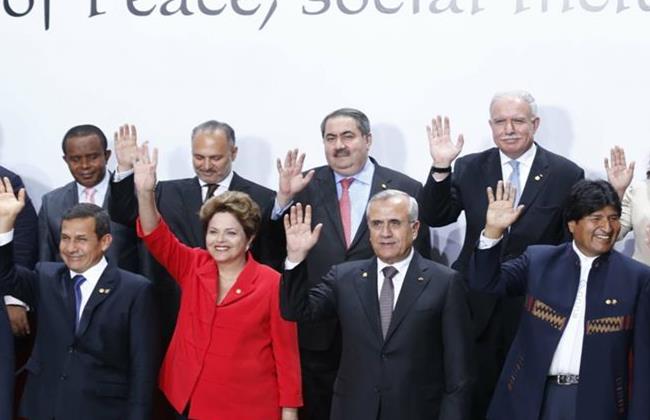Ivanna Klympush-Tsintsadze was appointed as the Vice Prime Minister of Ukraine for European and Euro-Atlantic Integration in April 2016. Immediately prior to that role, she served as a Member of the Ukrainian Parliament since 2014. She was also the First Deputy Chairperson of the Foreign Affairs Committee, and led Ukraine’s Parliamentary Delegation to NATO PA.
Michele Di Leo had a chance to speak to the Vice Prime Minister on topics of security and development related to Ukraine.
You are one of the strongest advocates for an independent and Western- aligned Ukraine. Where does this passion for political activism come from?
VPM: It’s actually about two things. My family comes from a part of Ukraine that was conquered by the Soviets after the Second World War. This was for my family, like for many Ukrainians, an important part of their memory because they still remembered the days of independence. They remembered the property rights and human rights they had previously enjoyed. The Soviet system did everything possible to erase this memory of the people. If we look at the way it tried to kill Ukrainians during the Great Famine, for example, as well as at other repressive mechanisms during Stalin’s time. I also think of my exposure to the West while I was travelling and studying. I happened to be in the U.S in ’92, immediately after the dissolution of the Soviet Union. It contributed to my understanding of freedom. It’s the case for many other Ukrainians as well. I know quite a few people who are employed in different areas of Ukrainian activism, as well as many others who studied abroad. Quite a few of them have stayed overseas. I was, of course, one of those who returned back home.
Could you talk about your educational background and how that prepared you to deal with your responsibilities as Vice-Prime Minister for EU and Euro-Atlantic integration?
VPM: I have Bachelor’s and Master’s in Speech Therapy. That’s where’ve I started from. I’ve also completed Bachelor`s and Master`s in International Relations at the Kyiv Institute of International Relations. I’ve also attended the Harvard Ukrainian Research Institute during the summer of 1992. From then on I’ve done a summer internship at WCVB, Channel 5, 6pm news back in Boston; initially I wanted to be a news anchor. Also, I did an exchange at Montana State University.
I think my whole life has been a learning experience as well. I came to be part of the Ukrainian parliament in 2014 from civil society. I made this decision after the events of Euromaidan which encouraged me to contribute to politics using my experience of working in analytical and charitable institutions on democracy building, security-related matters and international relations. This was a decision that many other Ukrainians made as well. They wanted to be engaged through political office in order to promote change in the country. I am not a party member (according to the Ukrainian legislation you cannot do that), and I was privileged to be appointed as a Vice Prime Minister for EU and Euro-Atlantic Integration. It fully corresponds to what I have been doing my whole life.
You worked as part of the Yalta European Strategy to promote the democratization of Ukraine since its independence in 1992. Why has it been so difficult to combat the Soviet legacy?
VPM: We are rebuilding the country from the Soviet system where everything was very strictly controlled. It was a system that was built not to be efficient but rather to be strong and impose fear on people. Thankfully, that’s something that has not found a root among Ukrainians.
Ukraine has been a free-thinking nation starting from the early times of the Kievan Rus, the cradle of Ukrainian statehood. Notwithstanding the fact that Russians want to steal this history from us, Russia was actually nonexistent at the time but that’s another story. Unfortunately, the Soviet system was very repressive. Even though Ukraine constantly advocated for democratic reforms since regaining of its independence 25 years ago, not much has been delivered. Therefore, when people were fighting in both revolutions in 2004 and 2013/14, they were fighting for justice, the rule of law, democracy, freedom, for making sure that their rights were being preserved, guaranteed and delivered by the state. I think that is the major point of the Ukrainian reforms so far. We have been taking concrete actions to deliver these reforms during the last 2.5 years.
What is the significance of Ukraine joining the European Union? Is it economic, cultural, or does it show that Ukraine is fully evolving as a country?
VPM: It’s a combination. Unfortunately, even though Ukrainian diplomacy tried a lot, we have not yet succeeded in setting the exact prospect of future EU membership for Ukraine. The EU-UA Association Agreement does not automatically provide membership. That’s one of the myths that was exploited in the Netherlands, which actually created problems for ratification as seen by the results of the Referendum (even though they have ratified the AA already in July of 2015 and now they are working on a specific statement that would allow the ratification). I continue to hope that Ukraine, the Netherlands and the European Council will find appropriate solutions that would also ensure that there would be no discrimination towards Ukraine, as we would not agree to any amendments or renegotiation of the Association Agreement.
How will the Association Agreement benefit the citizens of Ukraine?
VPM: This Association Agreement is a roadmap for internal change in Ukraine. It’s a change that can ensure that we will become a society based on clear rules and procedures that are compatible with those of other countries of the EU. After all, the EU has proven to be efficient and prosperous for its citizens. We want to ensure confidence in Ukraine of tomorrow; that’s something important for every single citizen. We see the Association Agreement as a way for us to become a better nation. For today, it’s not necessarily EU and NATO membership in and of itself. These are the tools for us to become a better nation and more compatible country. We’ve undertaken many obligations under that Association Agreement to include European legislation in our own Ukrainian legislative procedures.
Especially in the wake of Brexit, has it been of concern to you that the EU is facing difficulties within?
VPM: Absolutely. We find ourselves in a situation where it is very difficult to keep Ukraine high on the political agenda of the EU. It isn’t just because of Brexit. It’s also because of the migration and economic challenges in the EU. Countries also have to counteract Russian propaganda in the media, its direct support to some think tanks, its support of the radical right and radical left-wing parties. It can be hard to immediately see the truth somewhere in-between when so much is out there. So when you are searching for the truth between the lies, it is not necessarily fluffy and immediately understandable. The truth we see is that there is a very clear violation by the Russian Federation of the international law, norms of the civilized world that have been ensuring the stability and security in the world since World War II. We can start with Russia`s violation of the Budapest memorandum, upon which Ukraine gave up the third biggest nuclear arsenal in the world. Also, the assurances and guarantees that the territorial integrity of the countries shall not be violated. Russia has actually violated all of these. So it doesn’t have implications only for Ukraine, it has implications for the security and stability of Europe and the whole world. We have to understand this and we have to make sure that we are all together in deterring Russia.
I’m sure you are therefore also concerned about the upcoming elections next year.
VPM: These past and up-coming European elections are definitely a challenge because, unfortunately, the level of populism is extreme and becoming more so everyday. People want to hear simple solutions to difficult questions; they want to hear what populists have to offer. Therefore, that even makes it much more difficult for us. We can take a look at the results of elections in Bulgaria and Moldova. We hope that the common sense and laws and international law will prevail but so far we have heard the cause of the newly-elected president of Bulgaria, for example. They not only want to ease but completely take off the sanctions against the Russian Federation. We deem that impossible, as Russia have not delivered anything with respect to international law and Ukraine.
Are you worried that the recent President-elect has stated that he may scale back American commitment to NATO and its allies?
VPM: We very much hope that it will not happen. The U.S is after all a country that takes national security threats and challenges very seriously. It always takes policy into account when making decisions that affect international security. Also the program of the Republican Party is such that it will promote continual support to Ukraine and NATO which, I believe, is absolutely paramount to a safe world. Therefore, I think we should wait for the actions of the President-elect. We should also remember that Obama wanted to reset relations with the Russian Federation, and Hillary Clinton was the one who implemented this reset 8 years ago as well. We saw how things developed. There were good intentions because I understand that everybody is interested in dialogue. But I think dialogue is only possible when there is trust. When the other side is not delivering, it remains difficult to have any dialogue. I think the new US President will see that with regard to Russia.
What benefits would NATO membership bring to Ukraine?
VPM: First, I would like to say that for the first time since our independence, numbers show that over 50% of the population is in favor of Ukraine joining NATO. I think that this is more of an emotional answer to Russia’s aggression against us. The Ukrainian government is working with NATO right now on the program that would actually inform Ukrainian citizens what positive things NATO can bring. The Ukrainian army was deliberately destroyed by the previous autocratic authorities of Ukraine. NATO is supporting, through funds and through the member nations, the very necessary reforms of Ukraine`s security and defense sectors. These include reform of command, control and communication structures of the Ukrainian Armed forces; logistics system, cyber security etc. The war has taken away ten thousand Ukrainian lives, and has wounded another twenty- two and a half thousand, so NATO countries assist in the rehabilitation of our soldiers. The Russians have also placed many mines throughout the countryside so we are working to remove them; NATO is also investing in our emergency prevention capacities and in professional development. There is a huge variety of support reflected in the Comprehensive Assistance Package (CAP) which was adopted during the 2016 NATO Summit in Warsaw. One of the most important things is that Ukraine can be a contributor to international peace and security. Ukraine after all these years is the only country that has contributed to all NATO missions all over the world.
Canada of course is a Ukrainian ally and NATO country. Can you speak about the significance of the relationship between Ukraine and Canada?
VPM: We are very grateful for the support of both Canadian governments over the past two and a half years. We hope that this international stance and Ukraine’s support will continue on behalf of this government. We are also thankful for the support that Canada is giving our army, especially regarding the rehabilitation of wounded soldiers and training of our military; we understand this is also due to the very active engagement of the Ukrainian-Canadian community, but also because of the commonality of our values. We also have a connection because Canada and Ukraine are both multicultural and multiethnic societies that see strength in this multiplicity.
Do you have any final words you would like to offer to Prime Minister Trudeau?
VPM: I just hope that with the help of Prime Minister Trudeau we can continue to build on this common history. Canada was one of the first countries to recognize Ukrainian independence; we will always be grateful for this. We hope that we have a lot to build on with a prospect to further develop this necessary and strategic partnership.
Photo: Ivanna Klympush-Tsinstsadze at Open Ukraine Foundation (2010), via Wikimedia Commons. Licensed under CC BY 2.0.
Disclaimer: Any views or opinions expressed in articles are solely those of the authors and do not necessarily represent the views of the NATO Association of Canada.




